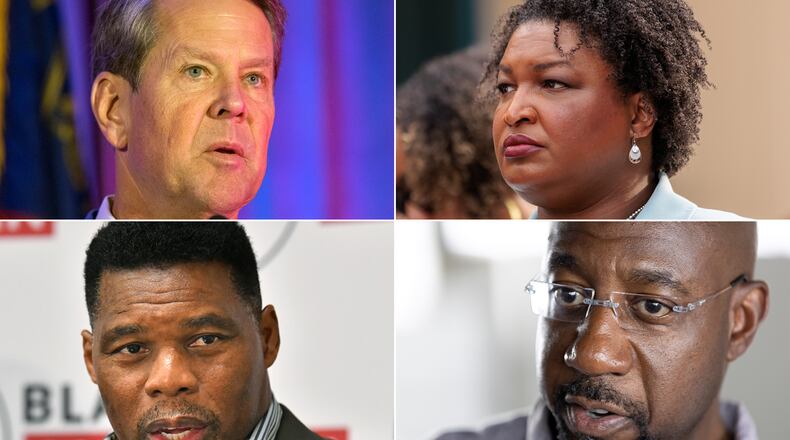NEWNAN — There’s so much political spending in Georgia this campaign season, some groups are literally giving money away.
At six events at gas stations and grocery stores across the state, the pro-Herschel Walker group 34N22 has gifted voters $50,000 worth of vouchers to highlight rising inflation in hopes of sinking Democratic U.S. Sen. Raphael Warnock.
Georgia’s top candidates and their allies have already devoted nearly $300 million to ads this election cycle, a once-unthinkable sum that now reflects the state’s rise as a political battleground.
That’s forced candidates and outside groups to dream up inventive ways to capture the attention of distracted voters — and to produce increasingly provocative ad campaigns designed to break through a cluttered media landscape.
As energy prices soared at the start of summer, Stacey Abrams bought ads on more than 5,500 gas station pumps highlighting her call to suspend the sales tax on fuel through the end of the year. She’s also timed TV ads to football-mad audiences, mindful of the allure of University of Georgia games in her rematch against Gov. Brian Kemp.
Walker’s campaign tried to weaponize the star of Warnock’s ads — a lovable beagle named Alvin — with a now-deleted ad that falsely claimed the pooch had “disappeared” as a weepy Sarah McLachlan tune played in the background.
And anti-Walker groups from both sides of the aisle have aired attacks with footage of the Republican’s ex-wife accusing him of threatening to harm her. Walker has said the violent behavior was the result of a mental illness.
The pleas for your attention will only escalate over a final surge of campaigning and get-out-the-vote efforts that will determine whether Democratic gains in 2020 were enduring or ephemeral.
And voters can expect another wave of spending by an array of outside groups with top offices on the line and another Senate contest that could decide control of the chamber.
“Campaigns have now become a team sport,” said Rick Dent, a veteran political adsmith. “Because in the end, voters can’t tell if it’s the Walker campaign, Kemp campaign or an outside group buying an ad. All that matters is the attack.”
Credit: Christina Matacotta
Credit: Christina Matacotta
Credit: arvin.temkar@ajc.com
Credit: arvin.temkar@ajc.com
‘Who’s ready to represent Georgia’?
There have been plenty of those to go around.
So far, more than $217 million has been spent or booked for TV ads in the Senate race. That’s $121 million to back Warnock and $96 million for Walker, according to Dent’s analysis.
In the race for governor, Democrats have a hefty advantage, too. Abrams and her allies account for $41 million in spending, compared with $28 million backing Kemp’s bid for a second term.
The ads are embedded with attempts to reframe the narrative of midterm elections in the nation’s most important political battleground. Abrams is pilloried as a tax-and-spend liberal. Anti-Kemp ads feature emotional testimony from women opposed to abortion restrictions that he championed.
No longer derided as a “radical liberal” like in 2020, Warnock has instead been framed by Republicans as a “nice guy” who votes too often with President Joe Biden, whose low approval ratings have complicated Democratic chances.
Walker, meanwhile, is derided as unfit to serve in a stream of ads featuring his bizarre statements and falsehoods. Outside groups have leveled sharper attacks about the former football star’s violent history, leaving Warnock to stay above the fray.
Asked at a campaign stop in Newnan whether his rival’s history of violent threats is fair game, Warnock sidestepped the issue.
“I think this election is about who’s ready to represent Georgia,” Warnock said. “And the good news is that the people of Georgia get to decide.”
Credit: Curtis Compton / Curtis.Compton@
Credit: Curtis Compton / Curtis.Compton@
Credit: Jason Getz / Jason.Getz@ajc.com
Credit: Jason Getz / Jason.Getz@ajc.com
‘Zero power’
The glut of ads has already inspired dread among Georgia voters.
Sam Ulrich is already worried that the campaign will mar his enjoyment of college football season.
“We need to buckle up, especially with all of the commercial breaks NCAA games have,” Ulrich saod.
Around this time of year, Margaret Arnett is thankful for her decision not to watch live TV and instead record her programs.
“Which means I can fast-forward through every single one of their ridiculous attack ads,” she said. “The candidates and their PACs can waste millions and millions attacking each other — but they have zero power over the fast-forward button on my remote.”
Which is why groups such as 34N22 are trying attention-grabbing voucher giveaways that have attracted outrage from critics furious that they’re allowed in a state that bans groups from distributing refreshments to waiting voters in line to cast ballots.
Election law experts say the programs are permissible under state and federal law so long as the vouchers aren’t tied to any condition, such as a requirement to vote for Walker or appear in an advertisement.
“TV ads will always be the most effective way to mass communicate, but our rural grocery and gas giveaways have been a unique force multiplier, offering a better bang for your buck — both literally and figuratively,” said Stephen Lawson, the group’s strategist.
“And with prices being what they are for many struggling families in Georgia,” he said, “$50 in free groceries often means a lot more than another TV ad on screen.”
Georgia election calendar
Oct. 10: Absentee ballots begin to be mailed
Oct. 11: Deadline to register to vote
Oct. 17: Three weeks of in-person early voting begins
Oct. 28: Last day to request an absentee ballot
Nov. 8: Election Day
About the Author
Keep Reading
The Latest
Featured






